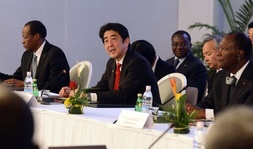 Source:news.so-net.ne.jp
Source:news.so-net.ne.jp In a particularly poignant article by the Kyodo Press (J), reasons for the visit emphasised the fact that in terms of gaining access to Africa, Japan has lagged behind other countries in promoting trade and development on the continent itself, a situation that China has certainly profited from through its active economic diplomacy aimed at securing greater access to resources. In the sub-Saharan region, the presence of large deposits of oil and minerals, despite being the source of numerous civil conflicts since the end of the Cold War, has meant that the region has experienced economic development on the back of increases in the price of raw materials. This, in a continent with a total population of over one billion, has led to the development of a middle class and its corresponding consumer activity.
The importance of Africa to global economic growth has spurred a continuous series of visits by foreign heads of state, the most memorable being the visit of Chinese President Xi Jinping in March of 2013, followed by US President Barack Obama later in the year. Such is the importance of Africa that it has become the arena for competition between emerging and established economies that has replaced the ideological battles between the US and the Soviet Union (battles that Japan fought on behalf of the US through extensions of aid and development funds from the period of PM Nakasone onwards (Michael Green, Japan’s Reluctant Realism, Council on Foreign Relations, 2003, p.16).
For PM Abe, the attraction of Africa extends to more than just resources. In the aftermath of the formation of the NSC and implementation of the NSS in December last year, the Abe government revealed its plan to have Japan appointed as a non-permanent member of the UN Security Council in 2015 (J). By doing so, this will both raise the profile of Japan on a global scale and increase Japan’s influence on decisions taken by the UNSC, an institution upon which China sits as a permanent member and whose opposition to Japan’s entry as a permanent member has vexed Japan since 2005. In order to provide a greater chance of success, Japan has approached African nations for their vote in return for a greater voice for both Asian and African interests, with a view to carrying those concerns on as a permanent member of the UNSC. It is a path that Australian trod during its candidature as a non-permanent member to the UNSC, and one that ultimately proved successful.
In an article for the National Bureau of Asian Research (PDF), Jeremy Taylor and Michael Walsh raised the possibility that emphasis by PM Abe on Japan’s role in the UNMISS (UN Mission in South Sudan) may in turn provide Abe with the means to further the ‘normalisation’ of the Self Defence Forces through ‘proactive pacifism’. This theory presupposes that UNMISS will prove a litmus test for the Abe government as it seeks to reinterpret the constitution and successfully pass legislation concerning collective self defence (which is unlikely considering the New Komeito’s position on the issue (J), and certainly not without provisos). By doing so, Japan will be able to participate in international operations on an equal footing with other nations, as…’To date, Japanese security operations in East Africa have enabled incremental changes that have moved Japan closer to collective defense in peacekeeping and the adoption of broader rules of engagement in military operations overseas’.
All of this is entirely plausible, although it seems somewhat far-fetched to suggest that East Africa is the ‘serious political, diplomatic, and military challenge’ to the Abe government that the authors claim it is. If any SDF member were to be killed by rebel forces, it would certainly provoke calls within Japan for withdrawal (primarily from the SDP (J) and the Japanese Communist Party (J), yet it would have little to no bearing on the Abe government’s commitment to the UN mission – indeed it could be used as a pretext for greater commitment, demonstrating that Japan, like other UN partners, is prepared to share the risks of international peacekeeping operations. This would be in keeping with the ethos outlined in the NSS (PDF, p.24), although it should be noted that in terms of Japan’s security priorities, Africa comes a long way down the list detailed in the NSS, with greater emphasis given to the Asia-Pacific, Europe, the Americas, and the Middle East.
Africa is certainly an opportunity in terms of its economic potential , but its attraction to Japan at present lies more in the collective votes in can provide in the UN than in any involvement in PKO and incremental changes to SDF operating procedures. Further visits from Abe government ministers will naturally follow, primarily to offset the influence of China and demonstrate Japan’s commitment to its promises of development assistance. Japan is still playing catch-up in increasing its presence on the global stage, yet if PM Abe’s recent activity is anything to go by, Japan will come to the fore of foreign affairs debate over the next twelve months, and that could make for interesting times indeed.
 RSS Feed
RSS Feed